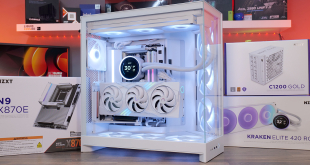As we all know by now, Intel announced that it was pulling all Cougar Point chipsets that support the new Sandybridge desktop and laptop processor family due to a design flaw in the chip controlling the Serial ATA II data inputs.
All H67 and P67 boards have two sets of SATA ports. Four of these support 3 Gbps operation and two support the faster 6Gbps speeds. Each of these sets requires its own PLL source. This problem in the chipset has been traced back to a transistor in the 3Gbps PLL clocking tree. This transistor has a very thin gate oxide which allows you to turn it on with a very low voltage. The mistake that Intel made was biasing the transistor with too high of a voltage which caused a higher than expected leakage current. Each transistor will operate slightly differently, so over time the leakage current can cause a failure on the 3Gbps ports. Luckily the fact that the 3Gbps and 6Gbps circuits have their own independent clocking trees helps ensure that the problem will be only limited to ports 2-5 of the controller.
Intel have recently announced that while they are working on remanufacturing the chipset that it will resume shipping the older, flawed version of the chipset and pledged to work with system vendors to either eliminate or minimise customer exposure to the potential issue.
This flaw is said to affect 5 to 15 percent of all Cougar Point motherboards and in a worst case scenario would make connected drives become unusuable over a period of time.
As KitGuru said last week, there are potential workarounds to this problem. System vendors can simply use the SATA III inputs. Most desktop systems have at least two SATA III ports, controlled by an uneffected controller chip, outside the Intel issue. Most laptop systems, have two working SATA III inputs, which means a vendor could ship with a hard drive and optical drive without risk to the customer.
Many vendors are considering (and some already are) shipping with a PCI express expansion card for the onboard SATA II inputs, in a similar fashion as to how you would upgrade an integrated graphics chip with a discrete graphics card. Intel says that they will ensure desktop vendors ship any Sandybridge system with the PCI Express workaround. These vendors have been told to remove the onboard Sata II input headers, meaning that customers won't accidentally use the headers later if they add more drives to the system.
This new arrangement certainly helps desktop oriented vendors who have been counting on the Sandy Bridge sales drive to boost their profits in Q1. Customers only have to agree to sacrifice a PCIe slot for the workaround.
KitGuru says: Other system vendors are already offering a free motherboard replacement later when the fixed boards are released, which we would assume will be by April.
 KitGuru KitGuru.net – Tech News | Hardware News | Hardware Reviews | IOS | Mobile | Gaming | Graphics Cards
KitGuru KitGuru.net – Tech News | Hardware News | Hardware Reviews | IOS | Mobile | Gaming | Graphics Cards



makes sense, seems such a waste to bin perfectly good boards. I would say 5% would ever use more than 3 ports.
I dont think the issue is such a big deal. I only ever use an SSD and a storage drive.
The ASRock P67 Extreme4 board has 4 of each SATA 3Gbps and 6Gbps, also has the new UEFI bios. I think the problem has been hyped up a little too much.
Something has a 5-15% chance of affecting you
Not likely to happen for 2-3 years
Easily circumvented by adding expansion card or not using the particular SATA ports mentioned.
Many retailers have replacement policy.
All warranties are still valid.
In the end.the average joe wont know or care.